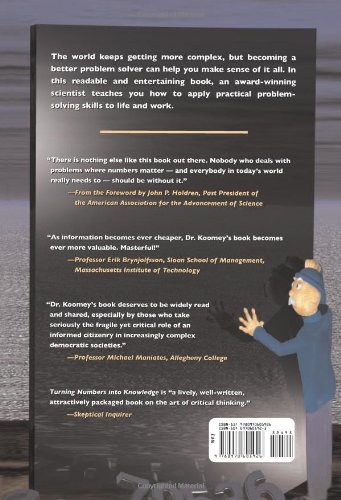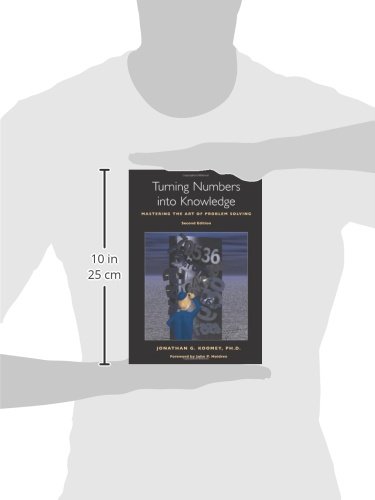



Full description not available
J**N
Good primer to problem solving
Professor Koomey's little book on problem solving is well done. The book is organized as if he were answering a question from a novice, "how" and Koomey takes the reader through an exhaustive and informative process. Importantly, he provides context of "what" to do before embarking. He stresses integrity of analysis, sources, data, and conclusions. Moshe Rubenstein wrote two great books on the mechanics of problem solving, but Koomey's book should be read first. Received today, read in one sitting and am certain I'll keep close by, as he provides lots of valuable tips. I plan to purchase for college age children and a couple of friends. Well-done Dr. Koomey!
T**M
Basic book
The subtitle of this book is slightly misleading. This isn't so much about problem solving as about information literacy, learning to do your research and think about the credibility of your sources. The book is presented in an enjoyable format, with very short chapters (2-4 pages) on each subject consisting of an anecdote or two, a few quotes, and perhaps a comic. It also cites a wide variety of references for readers who want to learn about the topics in greater depth.But aside from a few enjoyable stories, this book didn't teach me anything that I hadn't already picked up by the end of college. There is a great deal of commonsensical advice, like "Next time you find yourself resisting a new idea, take a deep breath and try to see the other point of view," plus outright fluff, like "After deciding what to do, you must follow through with action" and "Science and technology are a critical part of modern life." This might be an excellent primer for high schoolers, but based on the blurbs I was expecting something more advanced.
J**D
The Second Book on Research for Every Researcher
Every researcher's first reference book is a comprehensive treatment of the methods, designs and analysis strategies needed for their discipline. This book is a complement rather than a substitute for such a basic research reference. It covers the tactics, organizational strategies--even attitudes--that are needed on a practical level to get research done.I suggest using this book to do a quick "needs analysis" of your research style. Turn to the Preface and read through the annotated table of contents to identify the research tactic you most need to improve. (Mine was "Establish a Filing System.") You can assimilate the corresponding chapter in a few minutes and begin improving your skills.With 38 different chapters covering topics that range from overcoming "Beginner's Mind" to "Use the Internet" there is something for every researcher. I can envision an undergraduate research methods professor leading beginning researchers through a needs assessment discussion and assigning them to both remediate their top weakness and sharpen their top strength--knowing all the time that many will be enticed into reading most of the other chapters, too. (I can also imagine a surly senior professor hurling it at his new research assistant with "Don't bother me until you have read this!" I suppose that teaching strategy would work, too. But I won't recommend it.)The chapters are well organized and easy to learn from. Resources include both recommended books for in-depth exploration of each topic and a large number of relevant web sites for fast-click discovery. The book's own web site is a great place to start.A great resource to sharpen your research abilities and an enjoyable read, this book is worth its place on your bookshelf.
A**R
Huh? What am I missing? This is all so basic!
I bought this book due to the overwhelmingly positive reviews - thought it would really get into the meat of the issue and provide some creative insight. What a disappointment! It is very user-friendly...to the point of being almost insulting at times...very rudimentary. Provides little insight into anything new and is really just a primer. It may be good for college freshment or HS students that need an intro into problem solving via "numbers" or those seeking a quick refresher but for anyone who has ever worked with even basic research (of any type...business, science, economics) skip - it will bore you to tears. In places it is downright silly and I honestly can't understand how it obtained the reviews it did.
I**L
TNIK: For scientists & non-scientists alike
I began to enjoy the book almost from the very beginning, the writing style is easy to follow, and its explanations are straight to the point.Non-scientists & scientists alike will find useful:1) the methods and ideas for analyzing and testing for plausibility the everyday information encountered in the media,pointers to finding logical flaws in arguments, and common tricks used by presenters in order to be ambiguous or downright deceptive.2) simple methods of keeping facts at your fingertips3) the chapters on life improvement and work-efficiency which made this book pay for itself in a matter of days.4) helpful links to the Internet and to other books.Scientists and Engineers in particular will find useful· The back-of-the-envelope numerical methods. Many sci/engs do not use them enough.· The description of the scientific process, of which they are (often unconsciously) a part.· Suggestions on efficient, non-sloppy data analysis. The examples on data analysis are somewhat geared to the field of Energy Analysis, but easy to understand and generalize; in the process I learnt something about that field.· suggestions for clear, concise presentation of text and figures during presentation of results.This is also a good book to lend to a student intern or new employee to teach them back of the envelope statistical methods, how to get organized, and good habits, both organizational and data-analysis wise.
A**R
Five Stars
Perfect, thank you. No Issues to report
H**N
For Your Analytic Mind
I thought this book would be about quantitative approaches to solving problems. However, the author brilliantly weaved in a lot of common sense and practical advice on how to approach your professional and/or vocational endeavors. The chapter titles alone tells the story;1. Don't be intimidated by anyone2. Be a critical thinker3. Don't confuse what's countable with what really counts4. Get Organized5. Question Authority6. Dig into the numbers7. Focus on the essential8. Document, document, document9. Use the internet10. Remember that others don't care as much about your work as you do11. Synthesis follows AnalysisThe book is a great tool for analysts and anyone of influence. Jonathan Koomey, truly walks you through the steps for mastering the art of problem solving.
P**H
Make more out of the numbers driving your business
Every manager working today should try to read a few books on the topic of leveraging numbers that drive a business into actions rather than simply using them as facts. This book is probably the defacto reference book on the topic. The author has taken a relatively dry topic, and made it come alive in his writing. I would highly recommend this book or future editions of it.
S**R
Five Stars
Love it. Great book.
Trustpilot
1 week ago
2 days ago